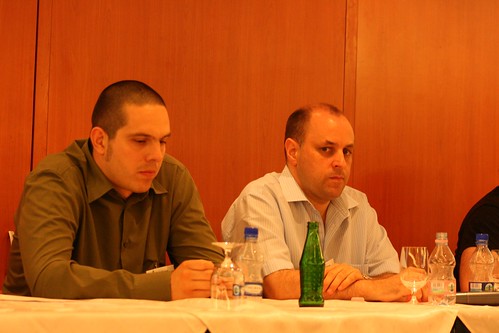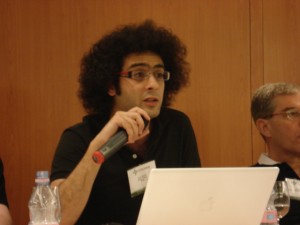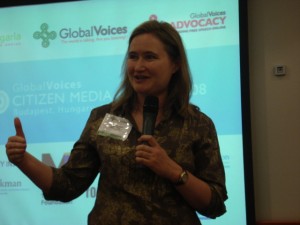The first day of the Global Voices 2008 Summit in Budapest, Hungary was a wild success, as far as we can see (obviously we can't know all of the implications this early in the game). The morning started with an introduction from Ethan Zuckerman and Rebecca MacKinnon, founders of Global Voices, during which they acknowledged the many sponsors and friends of the Global Voices Summit. Of particular note, they thanked Georgia Popplewell, Managing Director of GV and major guiding force of the Summit. Rebecca explained the impetus behind GV:
I came from journalism, Ethan from non-profits; we both shared concern about the media and global attention flows. I saw the international English-language media focusing a lot of attention on certain people and places, and less attention on other voices and places. Ethan was doing a lot of research on media attention patterns. We were studying the blogosphere and wanted to talk about all the people around the world who were starting to blog.
Following the introductions, Session 1: “Toward a Global Anti-censorship Network,” started up, with Helmi Noman moderating. Jillian York and Renata Avila liveblogged the session using CoveritLive. Internet filtering, self-censorship, and related issues in Egypt, Morocco, Belarus, Japan, and Pakistan were discussed during this session, which featured Sami Ben Gharbia, Chris Salzberg, Andrei Abozau, Ethan Zuckerman, Awab Alvi, and Alaa Abdel Fatah.
Session 2 was liveblogged by Juliana Rotich. Mary Joyce moderated; Ory Okolloh of Kenya, Wael Abbas of Egypt, Amine of Morocco, Oiwan Lam of hong Kong, Au Wai “Alex” Pang of Singapore, and Hamid Tehrani of Iran spoke on the subject “Citizen Media and Online Free Speech.” Issues broached during the discussion were the use of twitter, proxies and SMS to get around internet filtering and censorship. Each panelist shared stories of recent events from their countries.
Jillian York liveblogged Session 3, entitled “Living with Censorship.” Awab Alvi of Don't Block the Blog moderated, whilst Helmi Noman, CJ Hinke, Andrew Heavens, Rezwan, Yazan Badran, and John Kennedy were panelists. Each panelist discussed what it's like to live with censorship, and each had a different perspective on the issue.
Session 4, liveblogged by Juliana Rotich, brought special guests, whom moderator Ethan Zuckerman said we are very lucky to have at the Summit, as they are in high demand as speakers! Roger Dingledine of Tor, Nart Villeneuve (Citizen Lab), Isaac Mao (Digital Nomads Project), Robert Guerra (Privaterra), and Danny O'Brien (Electronic Frontier Foundation) spoke. Danny O'Brien discussed selecting a circumvention tool:
What criteria should you look for when choosing circumvention & anonymizing tools? This is important because some tools that you can use now may not be safe to use in future. Google may be good now, but as it continues to grow, will it remain so?
The features you want…
-You want a tool that is well funded.

Juliana notes that O'Brien recommends against commercial products.
The day wrapped up with Session 5, liveblogged by Rebecca Wanjiku and moderated by Xiao Qiang. Panelists were Clothilde Le Coz (RSF), Elijah Zarwan (HRW), Nasser Weddady (HAMSA), Stephanie Hankey (Tactical Tech), and Antony Loewenstein (Amnesty International Australia's campaign Uncensor).
Rebecca MacKinnon spoke at the very end of the panel, discussing censorship as a legal, political and social program:
Without the social layer on top of the technical and legal solutions, a lot of these problems are going to be difficult to solve. I was really struck by stories about social demoralization and isolation that some bloggers feel.
She added that we as citizens need to work together to get past censorship and focus on what we can do, rather than what we can’t. To conclude, she also mentioned how censorship can have a landslide effect, for example: Japan’s freedom of speech/anti-pornography censorship stance could be used as an example by China to subdue its activists and dissenters.
Day 2 promises to be just as incredible, with Rising Voices, GV Lingua, and other topics.









5 comments
I had the unique oportunity of know Global Voices at Campus Party Colombia. I been at David Sasaki’s presentation in Bogotá and i want to congratulate you, all your members. Right now, i’m very interesting in Hiperbarrio proyect in Medellín.
I putted the badge in my blog in a way of being helpful with a such beautiful intention. I’ll be following the Summit throught the streaming.
Salute,
Abadía Vernaza.
Not even one Hungarian news portal has reported in advance that such a summit would take place in Budapest.
This is not a free country.
You held your summit in the North Korea of Europe.
Consequently no Hungarian bloggers had the chance to sign up to deliver a presentation or a speech at the summit.
Hungary is not a free country, its citizen media is oppressed, the people’s opinion is silented, the corporaet and state media is dominated by the tyranny of “social”(neo)-liberial opinion.